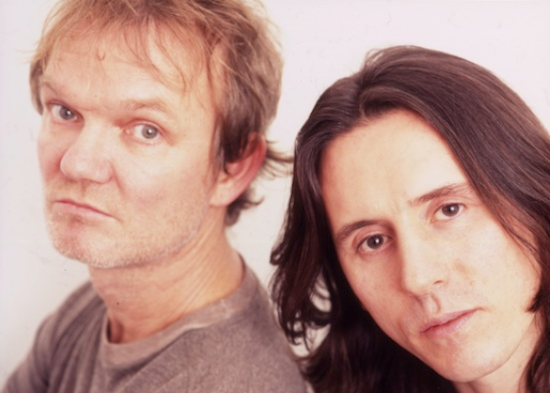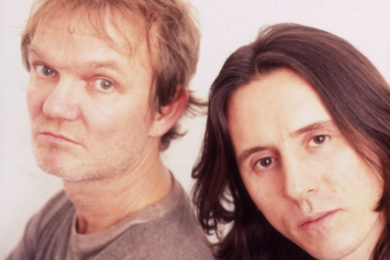Photograph courtesy of Mick Griffiths
The House Of Love were always best friends with Kipling’s twin imposters. The London quartet signed to Creation when they were impresario Alan McGee’s next big hope. In a puzzling conflict of interest, McGee was both their label boss and manager, as he had been for The Jesus And Mary Chain when trading them to Warner Brothers two years earlier, in 1985. Both the Mary Chain and The House Of Love could trace their lineage back to the Velvet Underground’s debut album, but HoL seemed outwardly less brittle and, perhaps, less likely to admit to heavy drug use in the American media.
Importantly for McGee, the House Of Love wanted to be a big, international act, in a pre-Oasis indie scene where ambition was considered insufferably gauche. Lead singer and songwriter Guy Chadwick had just turned 30, was on his second marriage, with a child on the way, and had spent the 80s driving vans around London, working for a shopfitter’s and playing in a string of disappointing bands, at best supporting never-weres like Spear Of Destiny. He knew all about disaster, and was desperate for triumph.
Living a military child’s itinerant lifestyle (the first record Chadwick can remember hearing is Rolf Harris’ ‘Sun Arise’, possibly on a Singaporean radio, the first band he loved was The Doors) he didn’t really get heavily into music until 1978, when punk reached his then-hometown Rugby. “That’s when it really hit me,” he recalls. “I’d started going to see pompous rock bands like Deep Purple, obviously amazing bands but fucking boring live, just watching drummers do drum solos. Pathetic. It’s really arrogant and it’s, so fucking what?”
The early House Of Love line-up settled around extravagantly talented and youthful guitarist Terry Bickers alongside rhythm players Chris Groothuizen and Pete Evans, although the welcome female influence of Andrea Heukamp disappeared after the first year. It wasn’t really punk, and it wasn’t quite the Velvets, but the band carved out a significant space for themselves musically.
Success came on quickly, as if forced by divinity, yet it disintegrated quicker, withered under a gypsy curse. In 1988 the band released the still-remarkable ‘Christine’, topped John Peel’s Festive Fifty with their fourth single, the tense, disturbed, ‘Destroy The Heart’, and issued an astonishing, 30-minute debut album of uniquely unhinged anthems and luminous, eerie ballads. It soon became Creation’s biggest-ever seller.
Yet Bickers soon suffered a very public and horrible breakdown, leaving the band after 18 months’ work on the second, major label album, amidst lurid tales of burning money and drug-induced psychosis. The band became stranded between two equally stormy seas – too big for indie, too indie for rock. Their lack of fellow travellers, such a bonus in the beginning, counted against them when the music press became increasingly fascinated by a succession of team-player fads, from indie-dance to shoegaze to grunge.
Chadwick continued with varying lineups, recycling old songs he’d written in the 80s and releasing two more very good albums (although 1992’s Babe Rainbow, he estimates, cost a jaw-dropping £250,000), yet watching their fanbase and media support gently melting away, until an inevitable split in 1993.
He spiralled. “I had a period of a few years where I was very depressed,” he says. “It was kind of because of what happened, but it was more that I realised suddenly that I wasn’t thinking straight, and it was a nasty shock to the system. I just couldn’t cope with it. I’d been living in quite a deluded state for a long time, I’d been smoking dope constantly for three years and I just wasn’t in reality at all.”
He’d always had a troubled relationship with drugs since trying LSD aged just 15. “I didn’t enjoy it really,” he remembers, “It was amazing, it was really strong, your first trip usually is, it was really intense, it went on and on. It was… uncomfortable. I don’t think drugs bring out a great side of me. I shouldn’t have taken them. I did a line of coke about five years ago and I just fell asleep. That just sums up drugs and me.”
Although he is tired of McGee’s peddling of the Chadwick-goes-drugs-bonkers stories, as told once again during the recent Upside Down documentary film, he acknowledges a certain truth behind it all.
“I personally always had a huge problem with self-esteem. It’s my biggest enemy, it’s what manifests itself in gross acts of arrogance, coupled with the opposite. And I’m sure a lot of people like me will say the same thing. It’s very hard to be like a brick and just take all the flak and deal with the (music) business.”
He spent some time trying to put together various replacement acts to fill the House-shaped hole. An accomplished but underwhelming solo album somehow emerged during the fug of depression. There were a few band projects that came to nothing, an electronic dance album which Mute’s Daniel Miller was interested in signing until Guy decided the songs weren’t good enough and junked the lot.
He decided to learn a new trade, and took up carpentry to keep his hands busy and make his brain "think in a totally different way", and he still runs a business making and fitting sash windows.
Then in 2002 the band’s former agent Mick asked him if he’d be interested in making a second solo album, and Guy turned him down, but suggested Mick might try to track down Terry, Chris and Pete to lay down their guns and give the band one last shot.
“I couldn’t deal with the rejection if no-one else wanted to do it,” admits Guy. It took a week to get the band in the same room (Chris agreed to show up and then never appeared) and it was three years until the Days Run Away album emerged, a strong album with at least one new classic House Of Love song, ‘Gotta Be That Way’. Guy still wasn’t fully satisfied.
“Even by the time we finished that album,” he reflects, “it still wasn’t a great relationship (with Bickers). We still weren’t seeing eye-to-eye and I think (now) that he was right about most things. Like, I just didn’t have the patience to take the time he wanted to take over things. He wanted to be a lot more relaxed, do a lot more gigs, develop things in a more organic way. I just didn’t have the patience. So it was quite fraught at times. It’s only really in the last few years that we feel relaxed enough to work together properly.”
The result is that, seven years later, they’ve just finished and released the second album of their second coming, She Paints Words In Red. The new album is far more Loaded than it is White Light/White Heat, more ‘Crush Me’ than ‘Christine’, rarely featuring the coruscating, string-melting solos of their early work. Still, when it is good, the House Of Love are as beautiful and strange as they ever were, with Chadwick sounding eerily unchanged.
“It sounds much better than we thought it would,” confesses Guy. “It did require a lot of creative work, a lot of soul searching.”
Arguments? Passive-aggressive or screaming and shouting?
“Oh, no, there was some serious shouting that went on in the studio. Mainly on my part. Terry doesn’t shout.”
Was it cathartic?
“No. Never. Just to get my point across,” Guy laughs drily. “I’m a very easy-going person, but if I feel I’m banging my head against a wall I’ll start shouting. The worst was about the sound of a track that didn’t even make the album. Terry and I just had completely opposite opinions. About the fourth or fifth time we’d recorded it, we’d done a backing track that didn’t sound very good so I went in on my own and pretended to be a garage guitarist. I thought I’d done the definitive version. And then Terry came in the next day and said, ‘um, I think I can make it better’, so then he redid it and started putting keyboards on and stuff like that and I was sitting there thinking ‘NO’ but trying to be really patient. And it just came to a point where I stood up and said (in the mildest voice possible) ‘this is fucking shit, I cannot play on this’ and I just shouted at Terry for five minutes. And he said, ‘OK, no problem.’”
Still married, he now has two daughters, the 13-year-old going to her first-ever gig at a House Of Love show in Poland recently. “I can’t drink a bottle of whiskey and go on stage and act like Nick Cave any more,” says Guy.
How long did it really take to get over what happened between ’88 and ’93?
“The trauma?” he asks hesitantly. “I don’t know. You either have to say to yourself, am I going to mope around wondering what might have happened, or am I going to get on with my life? My wife always says ‘you should write, not a book, but on your Facebook page, the truth about what really happened’, and there are so many things that annoy me, but you can’t change anything. The one thing I really feel so strongly about is just how incompetent, how totally useless that record company (Fontana) were after we left Creation, how they almost systematically destroyed the group. And they did it deliberately.”
Almost destroyed. It must seem strange to anyone who witnessed the band’s quiet, unmourned implosion 20 years ago, but in the end the House Of Love, that most brittle of bands, has outlasted both their record labels and repaired friendships that seemed to have broken forever. And even if they never do complete a seventh album, that has to count as some kind of triumph.
She Paints Words In Red is out now via Cherry Red Records and the band tour the UK in April – have a look at the dates below:
APRIL
Thu 4 – Georgian Theatre, Stockton-On-Tees
Fri 5 – The Arches, Glasgow
Sat 6 – Brudenell Social Club, Leeds
Sun 7 – Eric’s, Liverpool
Mon 8 – Sound Control, Manchester
Tue 9 – The Fleece, Bristol
Wed 10 – The Haunt, Brighton
Thu 11 – The Scala, London



